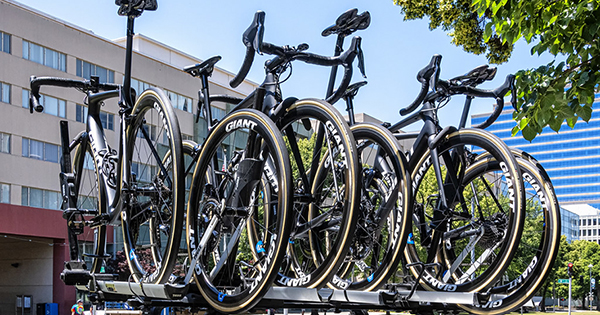By Peter Bengtsen
Copyright mondediplo

On 24 September 2025, the US Customs and Border Protection (CBP) said that it will detain bicycles, bicycle parts and accessories made by Giant Manufacturing in Taiwan, due to information that reasonably indicates the use of forced labor. US legislation (unlike that of the EU) allows authorities to stop imports at the border if forced labour is suspected. The import ban is the result of an investigation by CBP that identified five forced labor indicators: debt bondage, withholding of wages, excessive overtime, abusive working and living conditions and abuse of vulnerability.
The ban follows my exposure of migrant workers’ conditions at Giant, published by this paper in June 2024 and February 2025, and summarised in my report ‘Speed Up – addressing forced labor risks in Taiwan’s car, bicycle and electronics industries’ in March 2025, which covers workers’ testimonies as well as Giant’s remediation efforts. A petition based on my documentation was filed to CBP in July 2024, and Giant was informed.
Giant has said that it will contact CBP ‘to seek revocation of the import ban and explain that the company has already adopted appropriate measures’. The world’s biggest bike-maker also stated that it ‘is firmly committed to upholding human rights and labor protections, and has taken the following concrete actions: since January 2025, we have fully implemented a Zero Recruitment Fee Policy, under which all recruitment, agency, and government-related fees for newly hired migrant workers are fully covered by the company. By the end of 2024, we completed upgrades to employee housing, providing a safer and more comfortable living environment.’ In a material information statement to Taipei’s Stock Exchange, Giant said that ‘the estimated impact on Giant’s consolidated revenue ratio is 4-5%’.
The ban is the first of its kind on a Taiwanese manufacturer. However, the risk of debt bondage is the rule, not the exception, for migrants employed in Taiwan’s bicycle and other industries, as many incur high debts to pay recruiters exorbitant fees to get jobs. Between 2022 and 2025, my team and I conducted around 200 interviews with migrant workers, with testimonies that cover debt bondage due to high recruitment fees and other forced labor indicators.
Will the import ban on Giant speed up wider efforts to address forced labor risks throughout Taiwan’s bicycle industry?
Merida adopts zero-fee policy including reimbursements
Merida Bicycles, the world’s second biggest bike maker, said in late September that it will adopt a zero-fee recruitment policy by 1 October 2025. From now on, Merida will not allow that its Thai recruitment agency partners charge new workers fees for jobs. No migrant workers – new recruits and current employees – will have to pay monthly service fees to Taiwanese labor brokers, amounting to two months’ base wage during a three-year contract.
Merida’s commitment goes one step further. The company said that it is working on a reimbursement plan to compensate its current migrant workforce for their recruitment costs. Thai employees confirmed the information to us. Giant’s efforts did not include reimbursing recruitment fees to its migrant employees. Nor did any of Giant’s buyers – or any other bicycle brand or manufacturer – commit to this, when we asked them throughout the investigation.
Already, in spring, following my February article, Merida returned passports to workers. In summer, Merida allowed workers to get ATM cards. A petition on Merida was filed to CBP earlier in 2025 based on my documentation.
Migrants pay high fees for jobs elsewhere in Taiwan’s bicycle industry according to workers, including at Maxxis and Fox Factory. Maxxis, the world’s largest manufacturer of bicycle tires, employs 728 Vietnamese, Thai and Indonesian workers in its Taiwanese factories according to company documents. Maxxis is also one of the world’s top car tire-makers. It hasn’t replied requests for comment for a year.
At Fox Factory, the practice has been going on for years despite its policies prohibit recruitment fees. ‘We recognise that additional due diligence may be needed, when migrant labor populations are involved’, the company said. ‘We are in the process of conducting a comprehensive review of our current labour oversight mechanisms, particularly those involving third-party labour brokers and recruitment practices.’
Workers also said that for years they were charged fees for staying in Fox Factory’s dorm, though they lived and paid for dorm accommodation elsewhere, amounting to over two months’ base wages during their contract period. Since the beginning of 2025, workers have not paid double for dorms anymore.
Human rights are gaining traction in Taiwan’s bicycle industry. For the first time in the history of the annual high-profiled Taipei Cycle Show, this March industry leaders, senior government officials and global experts discussed the issue. A human rights code of conduct was signed by 82 Taiwanese bicycle manufacturers who joined hands in the new Bicycling Alliance for Sustainability (BAS) to address debt bondage and other risks.
But codes of conduct are no more than words, and BAS admitted that it might take years to address issues among all of its members, let alone the entire industry. Industry collaboration holds potential, but decades of abuses testify to an industry unable to monitor itself, unless progress is transparently shared with the public or civil society groups, or companies are held legally accountable.
In 2024, the EU passed legislation comparable – but far from identical – to the US import ban legislation, which in 2027 will allow authorities to prohibit products made wholly or partially with forced labour from being imported or sold on the EU market.



